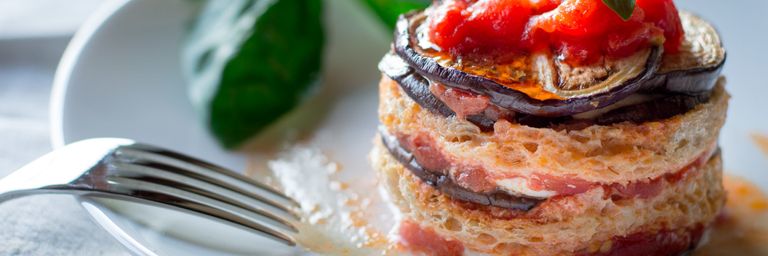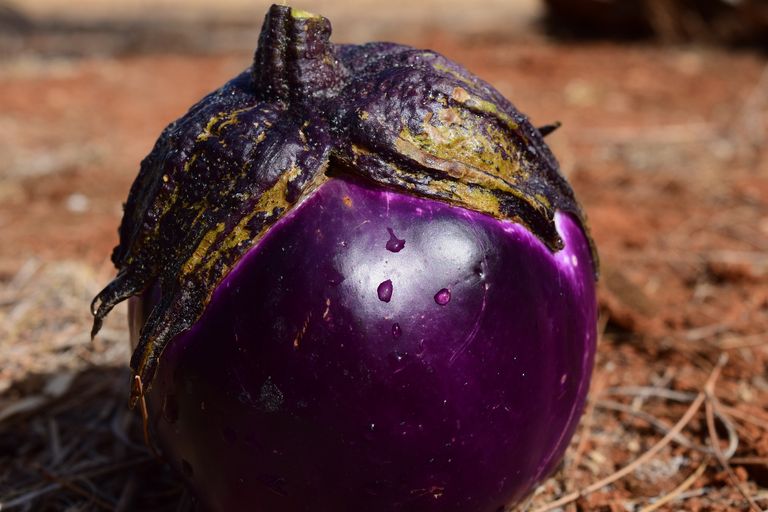
La berenjena es una verdura verdaderamente comestible sólo después de cocinada. Es bien sabido, por otra parte, que originalmente las plantas pertenecientes a la familia botánica Solanaceae no eran comestibles; en la naturaleza, los tomates, los pimientos y las berenjenas eran, en realidad, frutos amargos, ricos en alcaloides tóxicos que las propias plantas utilizaban para defenderse de los depredadores. La amplia disponibilidad actual de berenjenas de diferentes formas, colores y variedades, utilizables y consumibles, puede considerarse una demostración emblemática del compromiso del hombre y de su dominio sobre la naturaleza.
Originaria de Asia Central, la berenjena llegó posteriormente a Oriente Medio y, gracias a los árabes, se extendió a Europa. Y en este proceso de difusión, los turcos tuvieron un papel estratégico. Ya conocidos por haber "inventado" las berenjenas rellenas, los piratas sarracenos llevaban grandes reservas de berenjenas en sus barcos durante sus incursiones. En el proceso de contaminación gastronómica, la berenjena jugó un papel inigualable, gracias a los turcos que la introdujeron en la cuenca mediterránea.
A nivel nutricional, no sin antes haber dicho que las berenjenas se pueden incluir en el carrito de la compra de junio a septiembre, cabe señalar inmediatamente que esta solanácea se compone principalmente de agua, muy pocos lípidos y mucha fibra.
Ricos en polifenoles, los nutrientes también son responsables de su color, que puede variar del morado oscuro al rojo o naranja debido al mayor contenido de nasunina o betacaroteno respectivamente. La berenjena nos da la mayor satisfacción, evidentemente, si está cocida: pensemos en una parmesana o en una pasta normal, o en berenjenas a la plancha o a la sartén. En este último caso, ante el riesgo de un mayor peso calórico debido a su estructura esponjosa que tiende a absorber el aceite, bastará con poner la berenjena en contacto con la sal durante unos minutos, lo que hará que el agua se traslade al Departamentos porosos de la verdura para evitar que el aceite invada la berenjena, manteniendo intacto el sabor del plato pero dejándolo ligero.
Desde el punto de vista puramente sanitario y clínico, puede resultar útil proporcionar una serie de instrucciones para el consumo consciente de berenjenas.
Gracias a su rico aporte de nutrientes, es capaz de realizar una acción depurativa en beneficio del hígado, estimulando la producción de bilis y aportando así beneficios al intestino y también al páncreas; Entre otras cosas, gracias a su alto contenido en agua, la berenjena también cumple una función diurética y drenante.
El potasio y el magnesio presentes en él son útiles para quienes padecen hipertensión arterial y quienes experimentan calambres musculares.
Las berenjenas contienen fibras solubles capaces de unirse a las grasas del intestino, impidiendo su absorción; de esta forma ayudan a mantener bajo control los niveles de colesterol en sangre.
Las fibras, ya mencionadas en el punto anterior, ayudan a mantener una microbiota favorable ya que son un alimento fundamental para las bifidobacterias y lactobacilos que constituyen la parte más beneficiosa de la flora bacteriana intestinal.
La berenjena tiene un índice glucémico bajo y por tanto está indicada en la dieta de personas diabéticas; Además, su contenido en tiramina es útil para regular los niveles de insulina en sangre.
También es relevante el contenido de fitonutrientes, como antocianinas, ácido cafeico y ácido clorogénico, capaces de realizar una importante acción antioxidante y, por tanto, capaces de neutralizar los efectos nocivos de los radicales libres, contribuyendo así, entre otras cosas, a Proteger y fortalecer las paredes de los vasos sanguíneos.
La berenjena contiene nasunina, sustancia que le da su característico color violeta. Es una antocianina probablemente dotada de propiedades antitumorales, pero también estudiada por sus efectos antiinflamatorios, antivirales, inmunomoduladores e incluso protectores de las membranas de las células cerebrales, un apoyo útil en la prevención de enfermedades neurodegenerativas como, por ejemplo, La enfermedad de Alzheimer.
Además del potasio y el magnesio, ya mencionados anteriormente, las berenjenas también contienen calcio, cobre y manganeso, minerales útiles para prevenir la aparición de la osteoporosis.

Eggplant is a truly edible vegetable only after cooking. It is well known, on the other hand, that originally the plants belonging to the botanical family Solanaceae were not edible; In nature, tomatoes, peppers and eggplants were actually bitter fruits, rich in toxic alkaloids that the plants themselves used to defend themselves from predators. The current wide availability of eggplants of different shapes, colors and varieties, usable and consumable, can be considered an emblematic demonstration of man's commitment and his mastery over nature.
Originally from Central Asia, the eggplant later reached the Middle East and, thanks to the Arabs, spread to Europe. And in this diffusion process, the Turks had a strategic role. Already known for having "invented" stuffed eggplants, Saracen pirates carried large stores of eggplants on their ships during their raids. In the process of gastronomic contamination, the eggplant played an unparalleled role, thanks to the Turks who introduced it to the Mediterranean basin.
On a nutritional level, but not before having said that eggplants can be included in the shopping cart from June to September, it should be noted immediately that this nightshade is mainly composed of water, very few lipids and a lot of fiber.
Rich in polyphenols, the nutrients are also responsible for their color, which can vary from deep purple to red or orange due to the higher content of nasunin or beta-carotene respectively. Eggplant gives us the greatest satisfaction, obviously, if it is cooked: think of a parmigiana or a normal pasta, or grilled or pan-seared eggplants. In the latter case, given the risk of a higher caloric weight due to its spongy structure that tends to absorb oil, it will be enough to put the eggplant in contact with the salt for a few minutes, which will cause the water to move to the porous departments. of the vegetable to prevent the oil from invading the eggplant, keeping the flavor of the dish intact but leaving it light.
From a purely health and clinical point of view, it may be useful to provide a series of instructions for the conscious consumption of eggplants.
- Thanks to its rich supply of nutrients, it is capable of carrying out a purifying action for the benefit of the liver, stimulating the production of bile and thus providing benefits to the intestine and also the pancreas; Among other things, thanks to its high water content, eggplant also performs a diuretic and draining function.
- Potassium and magnesium present in it are useful for those suffering from high blood pressure and those experiencing muscle cramps.
- Eggplants contain soluble fibers capable of binding to fats in the intestine, preventing their absorption; In this way they help keep blood cholesterol levels under control.
- Fibers, already mentioned in the previous point, help maintain a favorable microbiota since they are a fundamental food for bifidobacteria and lactobacilli that constitute the most beneficial part of the intestinal bacterial flora.
- Eggplant has a low glycemic index and is therefore indicated in the diet of diabetic people; In addition, its tyramine content is useful for regulating insulin levels in the blood.
- Also relevant is the content of phytonutrients, such as anthocyanins, caffeic acid and chlorogenic acid, capable of carrying out an important antioxidant action and, therefore, capable of neutralizing the harmful effects of free radicals, thus contributing, among other things, to Protect and strengthen the walls of blood vessels.
- Eggplant contains nasunin, a substance that gives it its characteristic violet color. It is an anthocyanin probably endowed with antitumor properties, but also studied for its anti-inflammatory, antiviral, immunomodulatory and even protective effects on the membranes of brain cells, a useful support in the prevention of neurodegenerative diseases such as, for example, Alzheimer's disease.
- In addition to the potassium and magnesium, already mentioned above, eggplants also contain calcium, copper and manganese, useful minerals to prevent the onset of osteoporosis.

Receta para personas n. 4 / Recipe for people n. 4

- 12 rebanadas finas de pan duro
- 350 g de tomate sardo o cherry
- una berenjena
- 6-7 tomates secos en aceite
- 2-3 ramitas de albahaca
- 2 dientes de ajo
- vinagre de manzana
- 3 cucharadas de aceite de oliva virgen extra
- sal y pimienta

12 thin slices of stale bread
350 g of Sardinian or cherry tomatoes
an aubergine
6-7 dried tomatoes in oil
2-3 sprigs of basil
2 cloves of garlic
apple vinegar
3 tablespoons of extra virgin olive oil
salt and pepper

(35')
- Lavar la berenjena y cortarla en rodajas finas; cocínalos durante 2 minutos por cada lado en una parrilla caliente sin sazonar y luego marinalos en vinagre durante aproximadamente media hora.
- Cortar los ajos y picar la mitad de la albahaca.
- Exprime las berenjenas suavemente y colócalas en un plato; condimentado con ajo, 2 cucharadas de aceite, albahaca, sal y pimienta; mezcle y cocine por una hora más.
- Lavar y cortar los tomates; escurrir los tomates secos y cortarlos en trozos pequeños.
- Moja las rebanadas de pan con un poco de agua, exprímelas y coloca una en cada plato; colocar encima unas rodajas de berenjena, unos tomates secos y unas rodajas de tomate, añadir pimienta y terminar con una rebanada de pan: seguir hasta que se acabe el pan y las verduras.
- Completar con tomates y berenjenas, pimiento, un chorrito de aceite y el resto de albahaca.
- Sirve las “torres” de pan a temperatura ambiente.

Wash the aubergine and cut it into thin slices; cook them for 2 minutes on each side on a hot grill without seasoning and then marinate them in vinegar for about half an hour.
Slice the garlic and chop half the basil.
Squeeze the aubergines gently and place them on a plate; flavored with garlic, 2 tablespoons of oil, basil, salt and pepper; mix and cook for another hour.
Wash and slice the tomatoes; drain the dried tomatoes and cut them into small pieces.
Wet the slices of bread with a little water, squeeze them and place one on each plate; place a few slices of aubergine, some dried tomatoes and a few slices of tomato on top, add pepper and finish with a slice of bread: continue until you run out of bread and vegetables.
Complete with tomatoes and aubergines, pepper, a drizzle of oil and the remaining basil.
Serve the bread "towers" at room temperature.
CAMBIAR EL INGREDIENTE:
¿Quieres un sabor más fresco? Sustituye la berenjena por un par de pepinos en rodajas finas.
CHANGE THE INGREDIENT:
Do you want a fresher taste? Replace the aubergine with a couple of thinly sliced cucumbers.
Fuente imagen inicial . / Source initial image: Valcor
Fuente imagen final. / Source final image: Pixabay.
Estas recetas y tantas otras publicadas en #BLURT las pueden encontrar en mis blogs en italiano, inglés y español. Más de 5.000 recetas para darle fantasía y color a tu mesa y hacer una figura digna de un/a chefs con tus invitados.

These recipes and many others published in # BLURT can be found on my blogs in Italian, English and Spanish. More than 5,000 recipes to give fantasy and color to your table and make a figure worthy of a chef with your guests.
Y como siempre me despido de todos con un:
And as always I bid you all farewell with a:

Upvoted. Thank You for sending some of your rewards to @null. Read my last posts to make sure that BLURT burning is profitable for you. Before using this bot please make sure your account has at least 100 BP. Get more BLURT:
@ mariuszkarowski/how-to-get-automatic-upvote-from-my-accounts@ blurtbooster/blurt-booster-introduction-rules-and-guidelines-1699999662965@ nalexadre/blurt-nexus-creating-an-affiliate-account-1700008765859@ kryptodenno - win BLURT POWER delegationNote: This bot will not vote on AI-generated content
Thanks @ctime